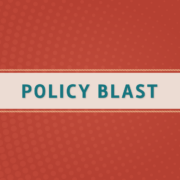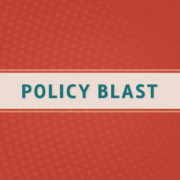NCUIH Board Approves Resolution on Advance Appropriations
On August 22, 2022, the National Council of Urban Indian Health (NCUIH) Board of Directors approved a resolution in support of advance appropriations for the Indian Health Service (IHS). Attaining advance appropriations has been a long-standing priority for NCUIH and Indian Country to ensure stable and predictable funding for IHS and American Indian/Alaska Native (AI/AN) healthcare.
Full Text of Resolution:
WHEREAS the National Council of Urban Indian Health (NCUIH) is the national representative of forty-one (41) urban Indian organizations (UIOs) receiving grants under Title V of the Indian Health Care Improvement Act (IHCIA) and the American Indians and Alaska Natives (AI/ANs) they serve;
WHEREAS NCUIH was established in 1998 to support the development of quality, accessible, and culturally sensitive health care programs for AI/ANs living in urban communities;
WHEREAS the United States has a unique and special relationship with AI/ANs as established through the U.S. Constitution, Treaties with Indian Tribes, U.S. Supreme Court decisions and Federal legislation;
WHEREAS this special relationship includes a trust responsibility to AI/AN citizens as established through Treaties with Indian Tribes, U.S. Supreme Court decisions, and Federal legislation;
WHEREAS the trust relationship requires the United States to provide federal health services to maintain and improve the health of AI/ANs, no matter where they live;
WHEREAS it is the declared policy of the United States, as provided in the ICHIA, “to ensure the highest possible health status for Indians and urban Indians and to provide all resources necessary to effect that policy;”
WHEREAS the Indian Health Service (IHS) is chronically underfunded by the federal government, and UIOs historically receive only one percent of appropriated funds for IHS;
WHEREAS the Indian health system, including IHS, Tribal, and UIO (I/T/U) facilities, is the only major federal provider of health care that is funded through annual appropriations;
WHEREAS according to the Congressional Research Service, since FY1997, IHS has only once, in FY2006, received full-year appropriations by the start of the fiscal year;
WHEREAS if IHS were to receive advance appropriations, it would not be subject to government shutdowns, automatic sequestration cuts, and continuing resolutions (CRs) as its funding for the next year would already be in place;
WHEREAS during the thirty-five (35) day government shutdown at the start of FY 2019, the Indian healthcare system was the only federal healthcare entity that was required to continue operations without appropriated funds;
WHEREAS during the FY 2019 shutdown, several UIOs did not have adequate funding to maintain normal operations, and were required to reduce services, lose staff, or close their doors entirely, putting the health and wellbeing of their patients at risk;
WHEREAS in a UIO shutdown survey, five (5) out of thirteen (13) UIOs indicated that they could only maintain normal operations for 30 days without federal funding;
WHEREAS advanced appropriations would uphold the trust responsibility by protecting the Indian healthcare system from future government shutdowns and not counting against spending caps; and
WHEREAS advanced appropriations are imperative to provide certainty to the Indian health system and ensure unrelated budget disagreements do not put AI/AN lives at stake.
NOW THEREFORE BE IT RESOLVED, that NCUIH requests that Congress amend the Indian Health Care Improvement Act to authorize Advanced Appropriation for IHS, including Tribal facilities and UIOs; and
BE IT FURTHER RESOLVED, that this resolution shall be the policy of NCUIH until it is withdrawn or modified by subsequent resolution.
CERTIFICATION
The foregoing resolution was adopted by NCUIH on August 22nd, 2022 with a quorum present.
Background on Advance Appropriations for IHS
Advance appropriations are appropriations that become available one year or more after the year for which the appropriations act is passed. The Indian healthcare system, which includes IHS facilities, Tribal facilities, and urban Indian organizations (UIOs), is the only major federal healthcare provider funded through annual appropriations. Funding through annual appropriations leads to funding uncertainty because the availability and amount of the appropriation is subject to the annual budget negotiation process. If IHS were to receive advance appropriations, it would not be subject to government shutdowns, automatic sequestration cuts, and continuing resolutions (CRs) as its funding for the next year would already be in place.
Lapses in federal funding risk American Indian and Alaska Native lives. Every year, on average, Congress passes five continuing resolutions to keep the government open while Congress reaches a budget agreement, and there were long government shutdowns in 1996, 2013, and 2019. During the Fiscal Year (FY) 2019 shutdown, several UIOs did not have adequate funding to maintain normal operations and were required to reduce services, lose staff, or close their doors entirely, putting the health and well-being of their patients at risk. In a UIO shutdown survey, five out of thirteen UIOs indicated that they could only maintain normal operations for 30 days without federal funding. One UIO suffered seven opioid overdoses, five of which were fatal. Presently, it is unlikely that Congress will reach a budget agreement before the September 30 deadline. If Congress does not reach a budget agreement, Congress will need to pass a continuing resolution to avoid a government shutdown.
NCUIH Resources on Advance Appropriations for IHS:
- Timeline of Advocacy and History of Advance Appropriations for the Indian Health Service
- Advance Appropriations for the Indian Health Service
- NCUIH Resolution Advance Appropriations
NCUIH and Indian Country Advocacy
NCUIH, along with three other national Native organizations the National Indian Health Board (NIHB), National Congress of American Indians (NCAI), United South and Easter Tribes (USET), have been advocating on behalf of advance appropriations for almost a decade. NIHB, NCAI, and USET have all passed resolutions in support of advance appropriations. However, these resolutions don’t explicitly mention UIOs or urban Indians. NCUIH’s resolution provides context for why advance appropriations are essential for UIOs and urban Indian populations and explicitly includes UIOs in the request for advance appropriations.
On January 17, 2019, NCUIH sent a letter to the Vice Chairman of the Senate Committee on Indian Affairs (SCIA), Tom Udall, in support of IHS advance appropriations legislation. On March 9, 2022, NCUIH joined NIHB and over seventy Tribal nations and national Indian organizations in sending a series of joint letters to Congress requesting advance appropriations for IHS in the FY 2022 omnibus. On June 16, 2022, NIHB and NCAI published a legislative action alert requesting that SCIA support and include IHS advance appropriations in the current FY 2023 appropriations bill. Most recently, NCUIH sent letters to Speaker Pelosi, House Minority Leader McCarthy , Senate Majority Leader Schumer, Senate Minority Leader McConnell, Senate Interior Appropriations Committee, and SCIA to support advance appropriations for IHS.
Federal and Congressional Support
There has also been strong long-standing support from Congress on this issue. On January 12, 2022, the Native American Caucus sent a letter to House Appropriations Committee Chair DeLauro and Ranking Member Granger requesting that advance appropriations for IHS for FY 2023 be included in the final FY 2022 appropriations bill. On June 3 the Native American Caucus sent another letter encouraging the Committee to work towards shifting IHS from discretionary to mandatory funding and requesting that, while this shift is underway, the Committee include advanced appropriations for IHS in the final FY 2023 Appropriations bill.
On April 25, 2022, a bipartisan group of 28 Representatives requested up to $949.9 million for urban Indian health in FY 2023 and advance appropriations for IHS until such time that authorizers move IHS to mandatory spending, and 12 Senators sent a letter with the same requests. Last year, for the first time ever, the Senate Appropriations Committee included an additional $6.58 billion in advance appropriations to IHS for FY 2023 in its FY 2022 Interior, Environment, and Related Agencies bill.
Back in 2014, SCIA held its first hearing on advance appropriation bill Indian Health Service Advance Appropriations Act of 2013 (S. 1570). In a 2019 House Natural Resources Subcommittee for Indigenous Peoples (SCIP) hearing on advance appropriations bills H.R. 1128 and H.R. 1135, former IHS Principal Deputy Director, Rear Admiral Michael Weahkee, reaffirmed Indian Country’s repeated request for advance appropriations stating that “[t]hrough the IHS’s robust annual Tribal Budget Consultation process, Tribal and Urban Indian Organization leaders have repeatedly and strongly recommended advance appropriations for the IHS as an essential means for ensuring continued access to critical health care services. The Department continues to hear directly from tribes advocating support for legislative language that would provide the authority of advance appropriations for the IHS. The issues that Tribes have identified present real challenges in Indian Country and we are eager to work with Congress on a variety of solutions.” More recently on July 28, 2022 IHS Acting Deputy Director Elizabeth Fowler reaffirmed IHS’s support for advance appropriations during a SCIP hearing on the Indian Health Service Advance Appropriations Act (H.R. 5549) stating that “[IHS] remain[s] firmly committed to improving quality, safety, and access to health care for American Indians and Alaskan Natives. Mandatory funding and advanced appropriations are necessary and critical steps toward that goal… [I] urge the House to act on advanced appropriations through the appropriations process with or without the authorizing legislation that is the subject of this hearing.”
The U.S. Commission on Civil Rights report from 2018, “Broken Promises: Continuing Federal Funding Shortfall for Native Americans” serves as another benchmark of support by including advance appropriations for IHS as a key recommendation to the federal government to ensure greater funding stability for IHS.
History of Advance Appropriations Bills
Legislation on this effort has been introduced in 11 bills since 2013:
- 10/2013 – Indian Health Service Advance Appropriations Act of 2013 (R. 3229/S. 1570)
- Sponsor: Rep. Don Young/Sen. Lisa Murkowski
- 1/2015 – Indian Health Service Advance Appropriations Act of 2015 (R. 395)
- Sponsor: Rep. Don Young
- 1/2017 – Indian Health Service Advance Appropriations Act of 2017 (R. 235)
- Sponsor: Rep. Don Young
- 2/2019 – Indian Programs Advance Appropriations Act (R. 1128/S. 229)
- Sponsor: Rep. Betty McCollum/Sen. Tom Udall
- 2/2019 – Indian Health Service Advance Appropriations Act of 2019 (R. 1135/S. 2541)
- Sponsor: Rep. Don Young/Sen. Lisa Murkowski
- 10/2021 – Indian Health Service Advance Appropriations Act (R. 5549)
- Sponsor: Rep. Don Young
- 10/2021 – Indian Programs Advance Appropriations Act of 2021 (R. 5567/S. 2985)
- Sponsor: Rep. Betty McCollum/Sen. Ben Ray Lujan
- 7/28/2022- Subcommittee for Indigenous Peoples (SCIP) held a hearing on the Indian Health Service Advance Appropriations Act (R.5549)
- Sponsor: Rep. Don Young
Next Steps
NCUIH will continue to advocate for Advance Appropriations for the 2022-23 Fiscal Year.









Leave a Reply
Want to join the discussion?Feel free to contribute!